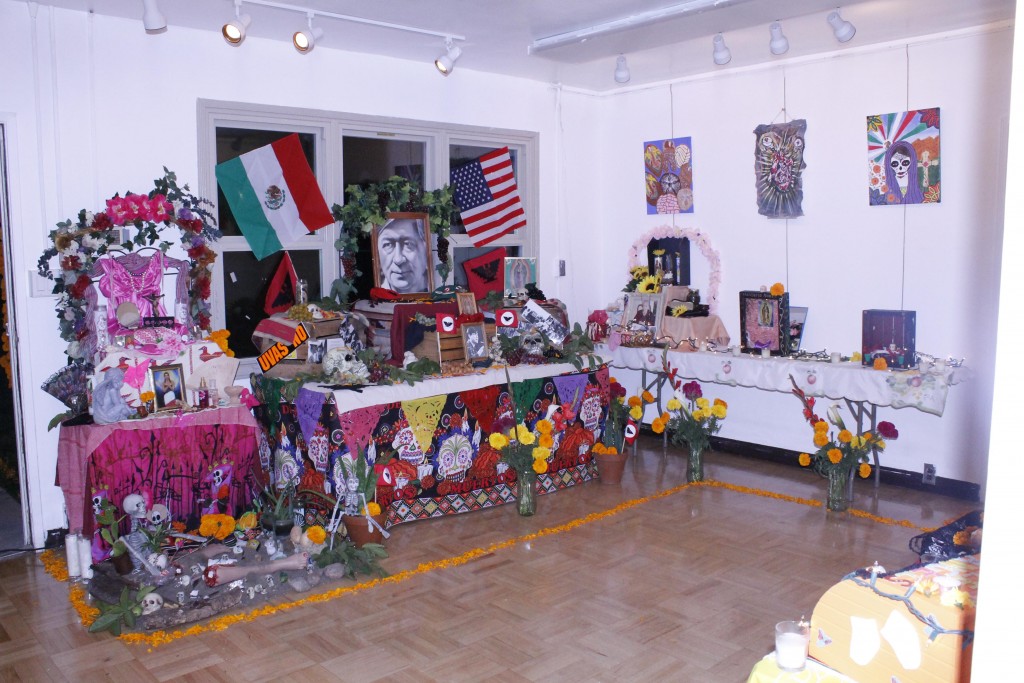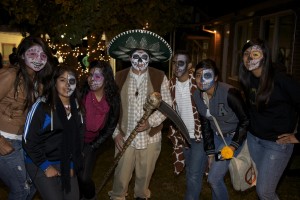CSUN to Host Its Annual Días De Los Muertos Celebration

An altar at CSUN’s Chicano House during a Dias de Los Muertos celebration. Photo courtesy of Yreina D. Cervántez
In conjunction with its 50-year anniversary, the department of Chicana/o studies at California State University, Northridge will hold its annual Días de Los Muertos (Day of the Dead) celebration, with two nights of events on Thursday, Oct. 31, and Friday, Nov. 1.
The Department of Chicana/o Studies – in collaboration with alumni, faculty, students, the student organization El Movimiento Estudiantil Chicano de Aztlán (MEChA) and CSUN’s Chicana/o studies professor Yreina D. Cervántez and her students – is co-hosting the community event.
Días de Los Muertos is an ancient tradition rooted in Mesoamerica dating back 3,000 years that honors ancestors and deceased loved ones. Originating from the native people of Mexico, the celebration combines indigenous Mesoamerican ritual with Catholicism brought to the region by Spanish conquistadors. Once a year, families honor the memory of their ancestors and the continuity of life with the belief that the souls of departed loved ones return to visit.
“It’s a very deep, ancient, spiritual and cultural tradition that’s about honoring our ancestors in a very profound and authentic way,” said, Chicana/o studies professor Lara Medina.
In the early 1970s, during the Chicano movement in California for civil rights, the tradition was reclaimed in urban areas like East Los Angeles, San Francisco and San Diego, she said.
“Our Chicano communities needed uplifting because they were facing so much death as a result of the Vietnam War, police brutality and overall discrimination,” Medina said.

Students at last year’s Días de Los Muertos Celebration. Photo by Jennifer Gutierrez Morgan
Cervántez added that “California’s artistic community really helped reconnect people with the traditions and ceremonies that helped revive Day of the Dead in Los Angeles and throughout the Southwest.”
At CSUN, Días de Los Muertos was introduced by Chicano/a studies professor Isabel Herrera, Margarita Nieto and other faculty members in the 1980s. It started as a small gathering that grown over the years.
“It has become part of our campus culture that attracts not only alumni, but people and many families from the community,” Medina said.
“This year, Tia Chucha’s Centro Cultural and Bookstore is also collaborating with our community event,” Cervántez said.
The first event, Noche de Ofrenda – night of offering, where altars are made to honor deceased loved ones – on Thursday, Oct. 31, will take place from 6 to 10 p.m. at the Chicano House at 18356 Plummer St.
Noche de Ofrenda is a community gathering where everyone can share stories of passed loved ones and contribute to altars with items and decorations that honor and recall their loved ones’ lives. Before meeting at the Chicano House, a procession will be held at 5:30 p.m., starting at the Jerome Richfield Hall, near the CSUN Library. Attendees will walk together across campus to the Chicano House.
“Traditionally, the items that go on the ofrenda are water, pictures, marigold flowers and food that their loved ones enjoyed during their lifetime,” Cervántez said.
The second event on Friday, Nov. 1, will take place from 6 p.m. to midnight, also at the Chicano House. The celebration will include music, dancing, food, a children’s corner and an art exhibition from the community and students. Both events are free and will be open to the public.
“Students and the community should understand the importance and significance of what it means to honor your loved ones who have passed on,” Medina said. “One of our elders, Doña Ofelia Esparza said, that there are three kinds of deaths: One is when our breathe carrying our spirit leaves our body. Two is when we’re physically buried or cremated so we’re no longer seen on this earth. Three is when we’re no longer spoken about and remembered. Días de Los Muertos prevents that final death.”

 experience
experience